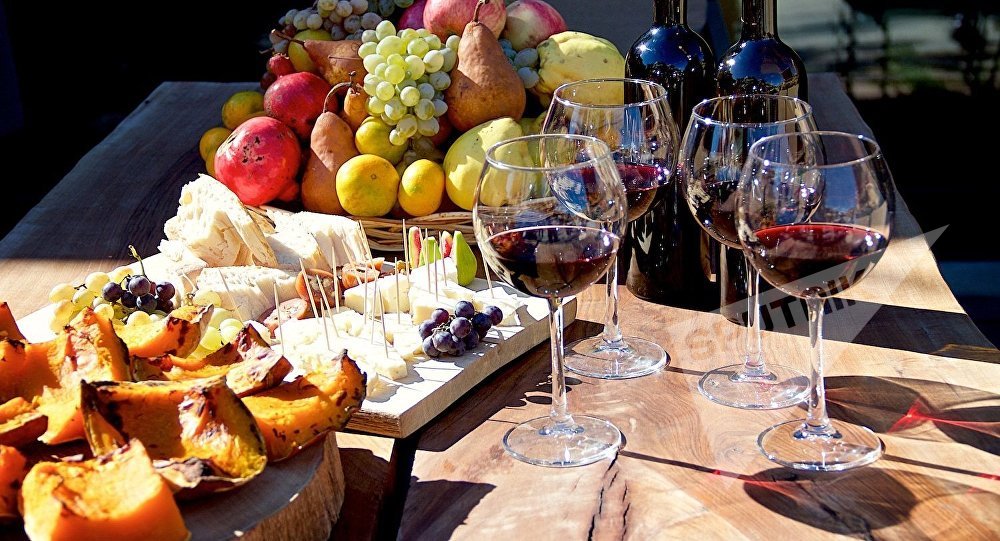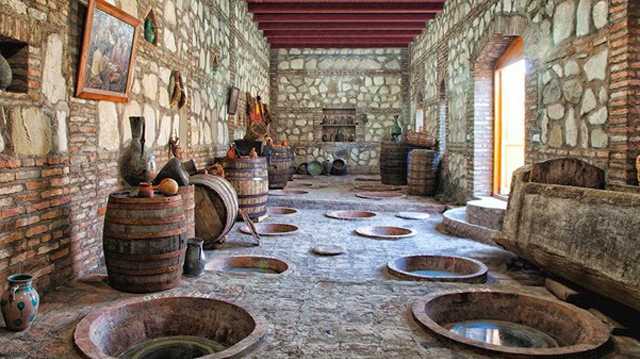Blog

Go back
#Georgia, Wine, Caucasus
From the “Kingdom of the Sun”: The Story of Wine From its Caucasus Roots
By Mary-Katherine Hilman
If you’ve read the Bible, Greek mythology, or any books about European gastronomy, you have a sense of how the world, historically, has cherished wine. In our increasingly globalized society, wine bottles from the most distant and remote regions make their way to our cellars and commercial store shelves. We can pour a glass knowing that each sip has a story— tracing back somewhere far, perhaps, to grapes, soil, and a family’s vineyard on the other side of the world from us.
While there are many families of grapes themselves, all winemaking can trace back to one place: 8,000 years ago in the Caucasus Mountains, where we now refer to as modern-day Georgia. From there, as you can see, wine traveled west over thousands of years, to Greece, Italy, Spain, France, and further into Europe; south and east into Syria, Jordan, Egypt, and so forth.
Today, we’re looking deeper into wine— at its origins and [literal] roots— to see what it can teach us. More than mere grape and viticultural facts, the story of wine seems to say something to us: something about ourselves and our early humanity; its desire for community, ritual, immortality, and, perhaps, other mysteries.
Here’s an ancient Georgian proverb that basically sums up viticulture 101 class: “Wine begins in the soil.” Although trends like blueberry, kiwi, and even banana wine have popped up on the internet and shelves, all wine in general began with grapes and inside Caucasus soil.
The Caucasus Mountain Region has incredibly biodiverse terrains, with slopes, rivers, elevations, lakes, two large seas nearby, and varying degrees of sunlight. This makes for some of the richest, most minerally diverse soil within a single location on Earth. With this range of soils, it shouldn’t come to a surprise that modern-day Georgia has the most indigenous varieties of grapes in the world—over 500.
Also inside Caucasus soil, archeologists have discovered remains of the earliest wine-making methods. The most significant of those is something Georgians actually still use today, called the Qvevri. This is an egg-shaped, clay pot that’s traditionally lined with beeswax before adding in the entirety of the grapes (flesh, skin, and seeds); afterwards, being lowered into the ground for fermentation.
Along with the spread of wine, this qvevri technology also spread; however, this particular method would eventually evolve and “die out” in other countries (with exception to one region in Portugal). The qvevri came to Portugal’s Alentejo region a ripe 2,000 years ago, and, remarkably, that’s the only place in Western Europe where the qvevri managed to survive. As for elsewhere, the techniques either industrialized or else simply adapted from the original, 8,000-year-old ways.
Today, Georgia’s the only country in the world that can say it started and kept using this ancient technique. To be fair, in recent decades, other wine countries have gotten inspired by Georgia and wine history, and they’ve begun re-introducing the qvevri method in certain wineries. Some other aspects of wine may have stayed more intact, though: Linguistically, the English word wine and Italian word, vino, as examples, may very well trace back to Georgia’s older word for wine, ghvino.
For Georgians, however, these terms have deeper meanings than they do in other countries (even France and Italy). In Georgia, wine is woven into nearly all fabrics of its society— gastronomic, communal, and religious. Whether they’re sipping wine made in their home, raising a toast with it at a supra, or else just attending an Orthodox mass, wine is central to Georgian life.
From young ages, many Georgian children get exposed to winemaking and learn the sacredness of wine (more for cultural preservation than entrepreneurial reasons). When harvesting the grapes, Georgians know to use as much of them as possible. They use them for not just wine, but also things like chacha (a translucent, grape-derived liquor) and churchkhela, the slightly sweet but tart, crunchy, and chewy snack hanging from strings all over Georgia. If you live in or visit Georgia, it’s actually hard to avoid grapes.
For Georgians, though, grapes and wine are tied not just to life, but to the afterlife. There’s something eternal about wine that Georgia’s civilization has always clung to and included in religious rituals. Within their largely Orthodox faith, it manifests as the blood of their god during Holy Communion. For them, there must be pride in knowing that this essential element to the massive Orthodox and Roman Catholics faith originated from home, in their own soil.
Based on archeology and literature, we know that wine held a special meaning even before Christianity arrived in Georgia: During pagan times, some Georgians were buried inside qvevri-shaped tombs, as if returning, like a ripened grape, to a symbolic womb for rebirth. This civilization had its own gods of wine and vines that preceded Greece’s Dionisus and Bachus; and yet, the great Greek myths still acknowledged where its most revered beverage came from, calling this enchanting, even more ancient place the “Kingdom of the Sun.”
Still, today, whenever the Tamada (toastmaster) toasts to life or the meaning of living, wine is always there. In other words, besides the wine itself, there’s something even more ancient in the glass— some old and very human desire to create things that will outlive us; for life to be a circular, rather than a linear, journey.
Seeing how wine has survived there in the qvevris, in its original home, it’s no surprise that Georgia clings to it. Throughout every invasion and change in its history, Georgia’s civilization has continued to live on; like the ancient grape vines themselves, it continuously sprouts with a rare boldness and diligence. Perhaps by resisting to over-industrialize and abandon the old ways, Georgia safeguards the very soul of its country. This reason for safeguarding the tradition— and not just what Georgia is safeguarding— is something truly worth experiencing there at the source.


